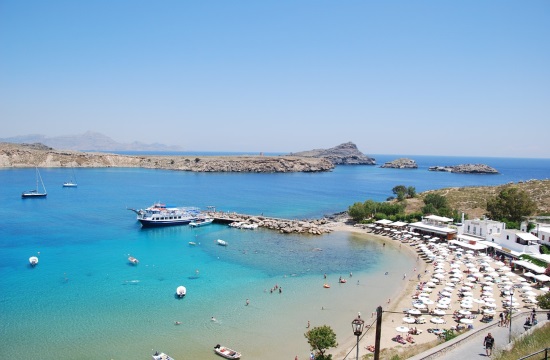Even as fires still burned on the island of Rhodes, forcing 19,000 people – mostly tourists – to flee for their lives, and there were fires in Euboea, Corfu and the mainland, the question arose whether visitors would continue to come.
The images of the evacuations were grim and stark, and likely unsettling for the Ministry of Tourism, with its leader Olga Kefalogianni largely out of sight and blaming the fires on climate change – something that happens almost every summer.
US National Public Radio (NPR) spoke with Doug Lansky, a global tourism expert based in Sweden, about the effects of the fires (there was also a record breaking and brutal heat wave) and the impact this would have on tourism revenues.
It came as tourists from Rhodes were being flown back on repatriation flights sent by their respective countries and the government had previously downplayed the risk and danger, saying only around 10% of the island was affected.
But one of the world’s biggest travel companies, TUI, has canceled flights to the island for the rest of July, fearing the fires could continue or flare up again as the government takes action. trying to cope with the new crisis.
NPR host Leila Fadel asked Lansky, “So this massive evacuation, the wildfires, the heat, what impact is that going to have on tourism in Greece?
He said the scenes had a major negative impact on tourism as they coincided with a heatwave that hit the Mediterranean, with temperatures in Greece hitting a record 115.52 degrees one day and regularly above 100 degrees for days.
“It was so incredibly hot. So even if there is no fire, it is very hot. And people have already fled some of these areas…it’s a huge part of the economy, and they’re in shock. It’s been – it’s very difficult. It’s a difficult time for them. But it may not be as bad as it seems everywhere,” he said.
When asked what he meant and what would happen if the heat and fires happened again in 2024 in Greece, which was unable to stop them, he replied that the tourists, many of whom are working from home as a result of the COVID-19 pandemic, could change when they come to months other than summer.
“They realize they can work just about anywhere, which means they may not need to travel there, like a lot of people, but only during the winter months. summer, the classic time to travel,” he said.
“They might be able to take advantage of some of those times, those long weekends in the fall or a week here and there, when it’s a better time to visit,” he said, in especially in early spring or fall in Greece, when the weather is nice, prices are cheaper and there are fewer people.
Greece has succeeded in attracting people during off-peak times and throughout the year, including winter, by offering alternative tourism ideas not dependent on the sun, beaches and islands.
But for those with families and school children, summer is the only option available to them. “There are still people with children – that’s when they’re out of school. And people will only be able to go to these places in the summer,” he said.
He also noted that in Rhodes, due to its geographical location, the fires had spread to an area with hotels and resorts, but elsewhere on the island there were no concerns about fires.
This, he said, is a good indicator despite the cancellation of some flights to the island by some airlines and the big month of August – as well as September – being crucial for the region’s economy.
“They had clear blue skies, no power cuts and everything is fine. I thought I might try booking there, so I checked the prices. They only fell about 10 percent.
“And for most of the tourist areas of the island, everything is operational,” they point out. So it’s important to call the hotels, check the terms, and most of them are still very open for business,” he advised.
Read more on thenationalherald.com
RELATED TOPICS: Greece, Greek tourism news, Tourism in Greece, The Greek Islands, Hotels in Greece, Trip to Greece, Greek destinations, Greek travel market, Greek tourism statistics, Greek tourism report
Photo sources: pixabay.com


